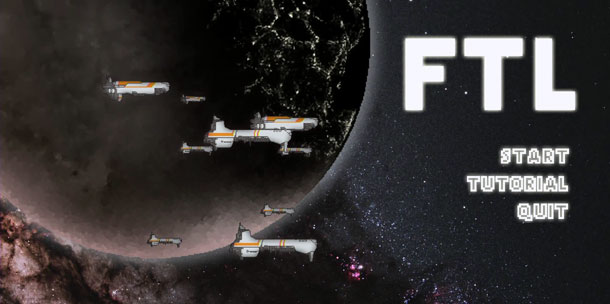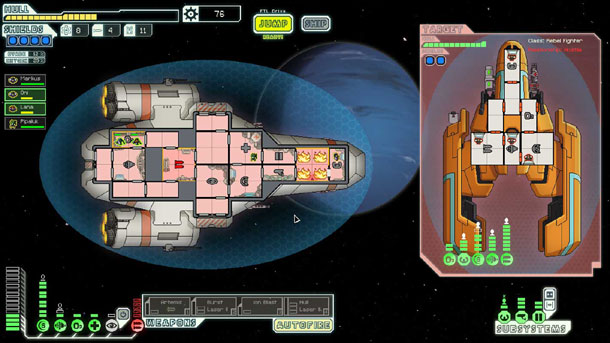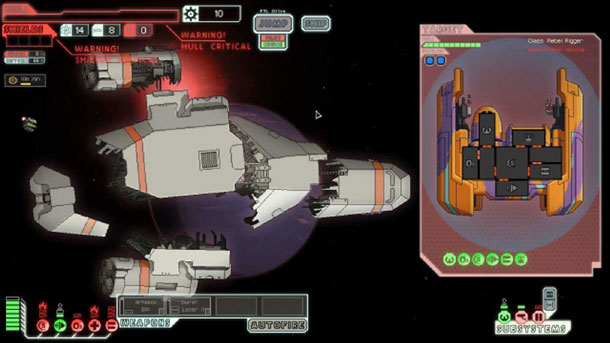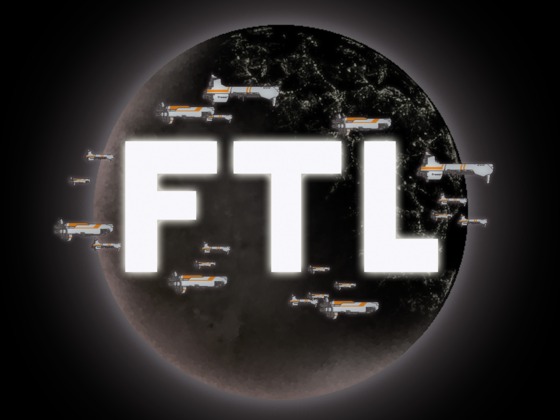
The battle was going poorly. Pirates lured me into a trap using a fake distress signal. My ship was boarded, several rooms already on fire from their barrage of missiles. I opened the airlocks, depressurizing the room that were on fire and connecting a path to where the intruders had beamed in, sucking away their precious oxygen while putting out the fires and hoping that it would be enough to take out the boarding party in the process. I huddled most of my crew in the medical bay, desperately hoping that they crew could repair it before the invaders reached them. If it were operational, they could be healed during the hand-to-hand conflict that was about the transpire.
At the last second, the medical bay was repaired, the enemy was defeated, and a few seconds later, my weapons finally were able to get their shields down long enough to damage their hull to the point where their ship was beyond repair. Their remaining crew surrendered. I hovered over the option to continue to fight, a sense of vengence over my lost crew members clouding my judgement. I decided to accept their surrender, take their payment for letting them go, and continue on my way.
This type of situation and the story that it spawn are what make FTL: Faster than Light a game that sinks its hooks into my sci-fi loving brain. Like the Roguelikes that inspired it, FTL is a game in which you have one shot at victory. One attempt to defeat all enemies that stand in your way. And since it is set in space, one chance to save the galaxy.
The Federation you belong to has fallen apart. The rebel fleet has taken over and is slowly expanding their influence across the various sectors of the galaxy. You and your crew must deliver a very important message that is the key to repelling the rebel fleet. It wont be easy. Space pirates, hostile aliens, and the ever approaching rebel fleet are all there to stand in your way.

FTL is a game that has several small systems that must be micromanaged to be successful. You have limited resources and have to take a lot of risks to keep your ship fueled, full of ammo and still have enough scrap (the game’s version of money) left for repairs and upgrades. In most situations, you have all the time you need to get things done. In combat, things can get hairy very quickly. Thankfully, you can pause the action at any time to give commands, reroute power to the appropriate ship’s systems, and choose where to target your weapons. This does an excellent job of keeping the battles from becoming too frantic to keep up with the action and makes it much more accessible.
Since FTL doesn’t let you reload a save over and over again, the only way to learn is by failing. Unless you are either just naturally amazingly talented at managing the games systems or incredibly lucky, you will fail a lot. Over and over again until you adjust and learn new strategies to take you slightly farther each playthrough until you finally get to fight the space boss.

I can always get behind a game that spawns discussion between the people playing it, and FTL is definitely one of those games. I found myself watching videos made by people who had early access so I could learn the strategies they were using and refine my own strategies.
FTL: Faster than Light is a game I know I will be playing for a long time. More than that it is a game that I know I will be recommending to friends for a long time to come. I would even suggest fans of science fiction that aren’t necessarily gamers give it a whirl if they want to feel like they’re commanding one of those ships that is on a trek through the stars. Even with its simple graphical style, it really sucks you into the captain’s chair and makes you feel like you are commanding your own star ship, right before the rebel fleet tricks you into flying too close to a star to get your shields down and blows you into space dust.
This review is based on a copy of the game sent to SideQuesting via GoG.com.


No Comments